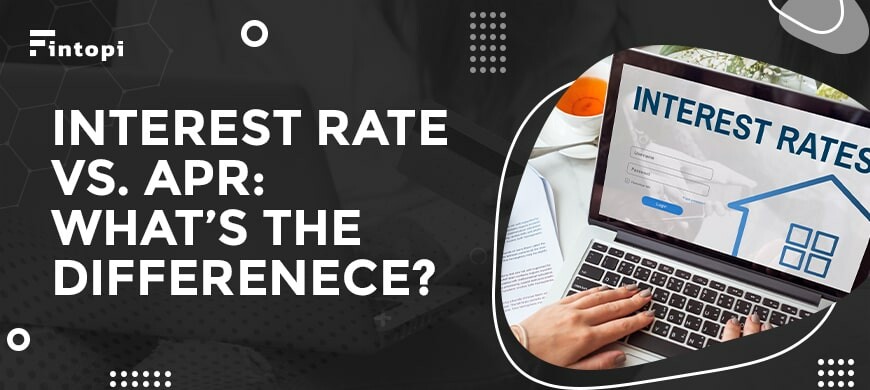Interest Rate vs. APR: Know Their Differences
You might think that all interest rates are the same, but there’s actually a big difference between an interest rate and an annual percentage rate (APR). In this article, we’ll explain what each one is and how they differ so that you can make informed decisions about borrowing money. The more you know, the better decision will be.
What Is Interest Rate?
When looking for a loan, you’ll see two key factors: the interest rate and the annual percentage rate (APR). They might seem similar, but they actually have different purposes. Here’s a closer look at the interest rate vs. APR.
The interest rate is the cost of borrowing money, expressed as a percentage of the total loan amount. For example, if you’re borrowing $100 at an interest rate of 5%, your interest would be $5.
The APR is a broader measure of the cost of borrowing money, taking into account the interest rate and any fees or other charges that come with the loan. The APR is expressed as a percentage of the total loan amount and can be higher than the interest rate.
How Are Interest Rates Determined?
Your interest rate is the cost of borrowing money, while your APR includes your interest rate plus other fees.
Interest rates are determined by many factors, including inflation, the Federal Reserve’s actions, and market conditions. Generally, interest rates will be higher when inflation is low, and the economy is strong. It’s the opposite when inflation is high, and the economy is weak.
The Federal Reserve can also influence interest rates by changing the federal funds rate, the rate at which banks lend money to each other overnight. When the federal funds rate goes up, so do loan interest rates.
Finally, market conditions play a role in determining interest rates. For example, lenders can charge higher interest rates if there is high demand for loans.
Knowing all this can help you make informed decisions about taking out loans and other forms of borrowing. Be sure to compare APRs and interest rates to get the best deal possible.
What is APR?
APR, or Annual Percentage Rate, is the amount of interest you will pay on a loan over a year. This includes any fees or additional costs associated with the loan. APR is typically higher than the interest rate because it consists of these extra costs. It’s important to understand the difference between APR and interest rate when shopping for a loan. The lower the APR, the less you will pay in interest and fees over the life of the loan.
How Is APR Determined?
The APR is the annual percentage rate charged for borrowing, expressed as a single percentage figure. It includes any fees or other charges that are related to the loan. The APR is the best way to compare different loans because it tells you the cost of borrowing.
To calculate the APR, lenders use a standard formula that takes into account the interest rate, any points and fees paid upfront, and any ongoing charges. The resulting figure is then expressed as a percentage of the total loan amount.
The APR can be fixed or variable, depending on the loan’s terms. A fixed APR means that the rate will not change over the life of the loan. A variable APR may start lower than a fixed rate, but it could increase or decrease over time, depending on changes in market conditions. Thus, it’s of utmost importance to understand financial climate and consider your own budget before deciding on any of these.
Interest Rate vs. APR: What are the Main Differences?
When borrowing money, it’s important to understand the difference between interest rates and APR. Though they may sound similar, these two terms actually have very different meanings. Here are the critical differences between interest rate and APR.
The interest rate is the percentage of a loan charged as interest. This is the cost of borrowing money, without any other costs. APR is the annual rate of interest charged on a loan, including any fees or other charges.
The main difference between interest rate and APR is that interest rate is only the cost of borrowing money. At the same time, APR includes additional charges such as fees, points, and mortgage insurance. So, when comparing loans, compare APRs rather than just interest rates.
Now that you know the difference between these two terms, you can be sure that you’re getting the best deal on your loan. Your choice will depend mainly on your budget and financial abilities.
Final Thoughts
When shopping for a loan, pay attention to both the interest rate and the APR to get the complete picture of what you’ll be paying. And remember, the lower, the better. Ensure to compare different loan types and different lenders and find yourself the most affordable deal. Sometimes, one loan may seem like a logical solution, such as mortgage for purchasing your property, but you can get better interest rate or APR with FHA loan. Inform yourself on everything before signing the deal. This deal will bind you for some time and you want to be sure that you’ve made the right choice.
Now that you know the difference between interest rate and APR, you can be a more informed borrower.



